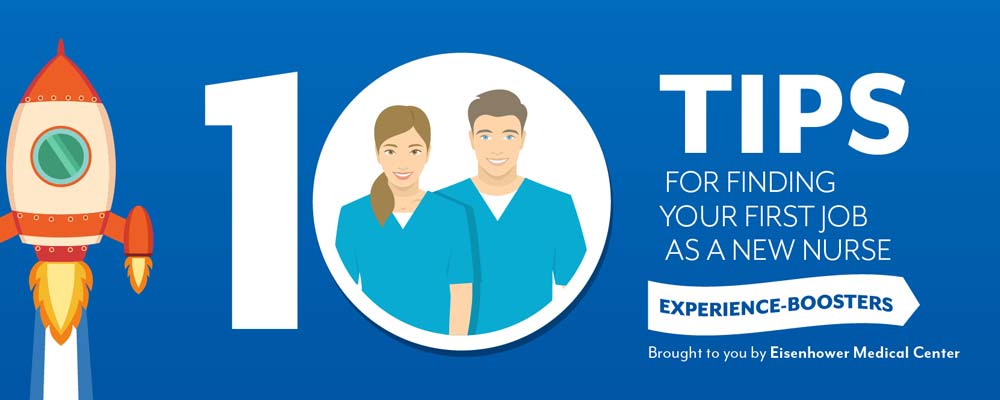Click here to see our full infographic
So you’ve just graduated from nursing school? Congratulations! You’ve worked hard, really hard, to earn the reward you’ve dreamed about: landing your first nursing job and beginning a long, fulfilling career as an expert practitioner.
Once your RN license is in hand, you’ll be one step closer to that dream; but first, you’ll benefit from a healthy dose of reality. Although you’d like to put the learning portion of your new career behind you and enthusiastically begin the doing part, a few important, and potentially challenging, lessons lie ahead.
When you started nursing school, you undoubtedly heard all about the many career opportunities available in nursing. It’s true. Nursing is a rich profession that crosses settings, specialties, and patients’ lifespans. It offers an impressive range of job opportunities, from acute care to community care environments and from pediatrics to geriatrics and every conceivable healthcare need in between. You’ve likely also heard that, despite reports of a nursing shortage in the U.S., new nursing graduates might have a tough time finding jobs. That part is also true.
It sounds like cruel irony. There’s a great need for qualified nurses in hospitals, outpatient clinics, schools — virtually anywhere nurses work — but many prospective employers will hardly glance at the resumes of new nurses to fill much-needed openings. To fully appreciate the reasons behind this conundrum, you might need a crash course in healthcare economics. But as a new grad at the beginning of your job search, you could encounter one of the reasons firsthand: Experience, or in your case, lack of it.
Hang in There
Hospitals and other nurse employers look for practitioners with experience (sometimes lots of it) to meet the high demands of patients’ increasingly complex clinical presentations. The mechanisms of nurse training and practice, however, have left you with a “cart before the horse” kind of predicament. You couldn’t begin to work with patients without training; but unless you’ve worked in a healthcare role in addition to your studies, the time you spent completing your education, as valuable as it is, was also time spent away from gaining actual, hands-on patient care experience.
Don’t be discouraged. As you’ll discover in your soon-to-be professional career, nursing isn’t for sissies. Nurses persevere — in all kinds of situations, even a job hunt.
As you hang up your cap and gown, take note of a few next-step lessons in securing your first nursing job. You’ll find the traits you develop or reinforce during your employment search will help form good habits that will serve you well throughout your long nursing career. Check out our infographic, “10 Tips for Finding Your First Job as a New Nurse”, that illustrates the following lessons.
Lesson 1: Finding Work Is Hard Work
Consider yourself lucky in this respect: Those seasoned nurses you so want to be like one day didn’t have the luxury of technology to aid their first nursing job search. Online job boards and employer websites are easily accessible to job seekers; and hospitals’ and most other large healthcare employers’ use of automated systems make submitting applications, resumes, and cover letters easy and efficient.
That’s where the easy ends, however. You’ll need to put in the same level of practical, nose-to-the-grindstone work your predecessors did on developing your resume and cover letter (more on those in our next blog post), researching potential employers, networking with other nurses, seeking advice from your instructors, and preparing for interviews. Beyond those basics, supplement your task mix by joining a professional nursing association for networking opportunities. What’s more, maintain or expand your knowledge base, especially in a specialty in which you’re interested, by following healthcare news topics, completing continuing education activities, and attending conferences, if possible.
Finding a job can be nearly a full-time job in itself — or a second job if you’re currently employed in or out of healthcare. Commit to the work and steel yourself:
Chances are you’ll hit the submit button on plenty of online employment applications before an opportunity pops.
Then, too, inject some discipline and strategy into the process: Consider positions that could provide the best stepping-stone experiences to inch you toward your ultimate career goals. If you’re determined to work in the neonatal ICU, for example, you might consider a position in a pediatric clinic to gain some experience working with infants. Although any nursing experience will count, you don’t have to accept the first position you’re offered.
Strengths you’ll sharpen: Fortitude, discipline, lifelong learning — all of which you’ll rely on throughout your career as a nursing professional.
Lesson 2: Appreciate the Bottom Rung
Everyone starts at the bottom. Period. Even the most admired and celebrated nurses started low and slow, using fortitude and discipline (see above!), before they reached the pinnacle of their profession. Florence Nightingale began her exalted career by simply caring for her ailing parents at home.
If your resume is short on experience, look for opportunities, however small, that place you in direct contact with patients. Explore internship, residency, and job shadowing openings at local hospitals (including Eisenhower Medical Center). Check out long-term care or psychiatric facilities as options, even though these may not be the specialties you’ll pursue in the long run. Also, consider per diem positions. Sure, the hours might be crappy and the work a little on the disjointed side if you shift between settings or facilities, but think of the patient care responsibilities you’ll gain in such a role. Don’t place yourself above grabbing a nursing assistant position, either, especially in a facility in which you’re interested in an eventual nursing position. Yes, you’d be overqualified for the role, but you’ll score opportunities to network and demonstrate your potential.
And don’t discount volunteering — at a health fair, community center, or hospital — even if you’ve already settled, at least temporarily, into a paying role. Healthcare recruiters view volunteer experiences favorably. Those few hours you spend each week with a couple of dozen seniors and a blood pressure cuff could score you additional points on an employment application.
Strengths you’ll sharpen: Patience and humility. Practice these now because you’ll be humbled in your first full-fledged nursing role. Although you’ll be well educated, you’ll still have a lot to learn, particularly from experienced nurses who deserve your respect. You don’t need to be meek (as a nurse, you shouldn’t be, in fact), but a little modesty can go a long way in developing helpful on-the-job relationships at the start of your career.
Lesson 3: Keep Stress in Check
Job hunting is notoriously stressful — and so is nursing. Take the time to build good stress-busting habits during your employment search that you can rely on later in your career.
Time spent searching job boards, researching, and networking without immediate results can be disheartening and debilitating at times. Close your laptop and step away from the career chasm every now and then. Go for a walk. Enjoy a hobby. Spend time with family and friends — anything that helps you clear your mind and revive your energy.
Strengths you’ll sharpen: The ability to relax and rejuvenate is essential to avoid burnout in the fast-paced, demanding nursing world. Your older and wiser nursing self will thank you for forming a foundation of personal health and wellness at the start of your career.
Finally, here’s a valuable tip: Eisenhower Medical Center in Rancho Mirage, CA, offers a comprehensive, year-long New Graduate RN Residency Program that provides new nurses opportunities to develop skills while providing safe, effective care to patients. Learn more about registered nursing at Eisenhower and how to apply for the residency program.
Originally posted on 5/17/2017




